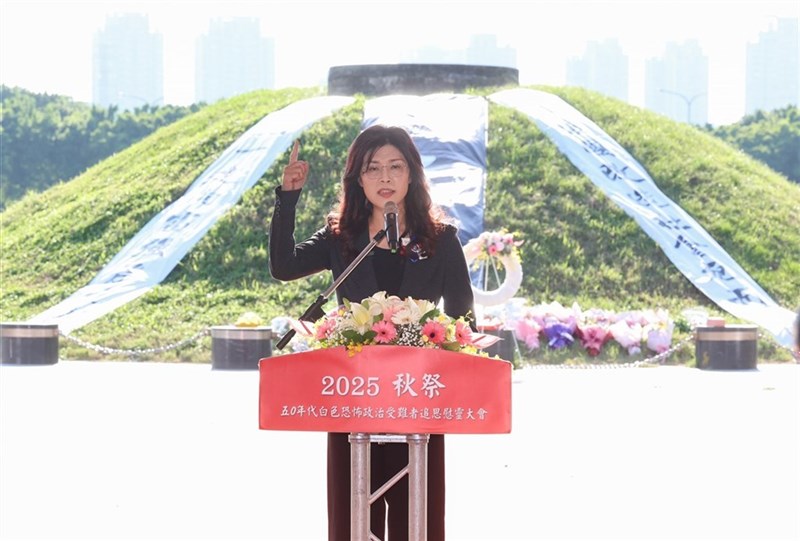MAC condemns KMT chair for attending controversial White Terror memorial

Taipei, Nov. 9 (CNA) The Mainland Affairs Council (MAC) has criticized opposition Kuomintang (KMT) Chairperson Cheng Li-wun (鄭麗文) for attending a controversial White Terror memorial that included Wu Shi (吳石), a late high-ranking Chinese communist spy, among those commemorated.
Portraying a traitor as a victim of the tragic conflict between the KMT and the Chinese Communist Party (CCP) and justifying such an act as defending political differences, "is a grave insult to the nation's dignity and the greatest humiliation to the countless Republic of China soldiers and civilians who suffered or died because of Wu Shi," the MAC said in a statement released Saturday.
The MAC urged Cheng to focus on the 232 Taiwanese nationals who are currently missing or detained in China, rather than commemorating figures such as Wu.
"Their human rights and freedom are far more urgent and legitimate concerns than paying tribute to Wu Shi," the MAC said.
The statement came after Cheng attended the event at Machangding Memorial Park in Taipei earlier Saturday, which commemorated those persecuted during the White Terror period between 1949 and 1992, when many were imprisoned or executed for alleged political dissent.
Cheng explained that she accepted the invitation of a group representing the politically persecuted to mourn victims and their families, reflect on the injustices of the period, and advocate for peace -- not to honor intelligence operatives.
She added that the event has been held for more than three decades and has never focused on commemorating Wu or others like him, but primarily on victims persecuted for their political beliefs or stances.
However, Wu's photo was displayed alongside those of other victims at the memorial, while the event handbook featured an article referring to him as a "martyr."
"He was neither a traitor in the traditional sense nor merely a victim to be mourned. His sacrifice should not be viewed solely in terms of allegiance or loyalty, but rather understood within the broader context of the unfinished process of national liberation and unification," according to the article.
Civil society group's condemnation
Meanwhile, the Taiwan Society North, a pro-independence civil society organization, issued a statement Sunday, criticizing Cheng for participating in an event organized by "pro-unification" groups that glorified "authoritarianism" -- meaning communist China.
The association alleged that Wu leaked intelligence during the Huaihai Campaign, or Battle of the Hsupeng (徐蚌會戰), between November 1948 and January 1949, leading to the destruction of more than 100,000 Nationalist (Kuomintang) troops.
A lieutenant general in the Nationalist Army, Wu leaked intelligence during the major Communist-Nationalist battle, leading to the massive death of Nationalist soldiers, and he is now being portrayed by the CCP as a "martyr," it said.
"If Cheng Li-wun continues to claim to be a leader of a Republic of China political party but participates in events honoring a Communist spy, it is tantamount to endorsing the CCP's narrative and becoming part of its fifth column," the association said.
Wu infiltrated the KMT government in the late 1940s and secretly worked for the CCP shortly after arriving in Taiwan in 1949. He was later exposed and executed in 1950 for espionage, and was posthumously honored by Beijing as a "revolutionary martyr."
No. 1 spy
Known to the CCP as "Secret Envoy No. 1," Wu was appointed deputy chief of staff of the Ministry of National Defense upon arriving in Taiwan and provided the CCP with significant military intelligence, according to information on the Taiwan Human Rights Memory Bank website, operated by the National Human Rights Museum.
In March 1949, Wu delivered the KMT's Yangtze River defense deployment map to the CCP's East China Bureau, playing a key role in the CCP's victory in the Chinese Civil War, according to a 2019 Control Yuan report.
The defense ministry of the then KMT-ruled ROC government in Taiwan later uncovered Wu's espionage network, preventing him and his associates from supplying the CCP with military intelligence that could have seriously jeopardized Taiwan's strategic deployments and operational success, the report said.
The discovery "contributed to the stability of the Taiwan Strait and the safeguarding of national security," the report added.
KMT chair's controversial appearance
The controversy over Cheng's attendance at Saturday's memorial has come amid renewed Chinese efforts to glorify Wu Shi.
China's Ministry of State Security and Taiwan Affairs Office recently co-directed a spy drama "Silent Honor" (沉默的榮耀) based on Wu's life.
The series premiered on state broadcaster CCTV on Sept. 30, China's Martyrs' Day, as well as the eve of China's National Day on Oct. 1 and portrayed Wu as a national hero.
-
Society
3 freeway accidents cleared as Lunar New Year traffic builds
02/15/2026 08:12 PM -
Politics
Lai vows stronger defense, economy, welfare in pre-Lunar New Year remarks
02/15/2026 08:05 PM -
Society
Molly the hamster finds new home after street life ordeal in New Taipei
02/15/2026 06:35 PM -
Business
CPC to freeze fuel prices over Lunar New Year holiday
02/15/2026 05:25 PM -
Politics
Taiwan vice premier returns home after trade agreement signed with U.S.
02/15/2026 04:45 PM